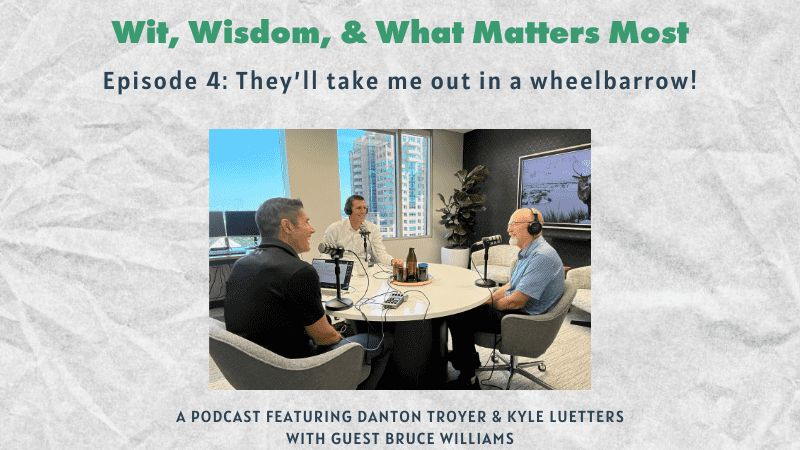Episode Transcript
Show Notes
featuring Bruce Williams
Kyle: Welcome to Wit, Wisdom, and What Matters Most, a podcast with Moneta’s Gast Freeman Troyer Racen Team. My name is Kyle Luetters, joined alongside Danton Troyer.
Very excited for this episode because it’s someone, Danton, that, you’ll hear me mention in the actual interview, but I’m kind of a fanboy of. His name is Bruce Williams, owns a very unique company down in Farmington, Missouri, called US Tool, and the conversation really spans a lot of different topics.
Danton: Yeah, and I think when you first talk about US Tool, it doesn’t maybe sound terribly exciting.
Kyle: Not on a script, yes.
Danton: Yeah, but once you hear Bruce start talking about it and his passion around making tools, and it’s certainly more than that. I think the business is, what it’s doing obviously matters, but his culture and the story behind it is fascinating. From the culture he’s built, going from 20 employees to 1,200, and potentially having a fourth generation in the business, it’s not something you hear about every day.
Kyle: It really is not, and in this interview, there were a number of things that I learned, like how all of this really did get started, and I won’t give it away right now, let Bruce take the punchline on this, but it’s definitely not what I originally thought it was. And he really starts to speak about the genesis of the company, how they transitioned amongst now two generations, and really what he’s kind of carved out for himself.
Danton: Yeah, it’s really one of the more interesting stories from a family business that I’ve heard.
Kyle: All right, without further ado, this is our conversation with Bruce Williams.
At this time, it’s our pleasure to welcome Bruce Williams to Wit, Wisdom, and What Matters Most. Bruce, how are you doing today?
Bruce: I am doing just great. It’s a pleasure to be here. Thank you for inviting me.
Kyle: Awesome, and frankly, I’m gonna fanboy out here a little bit. This has been one of the guests I’ve been looking forward to the most, because I really find your and your family’s story interesting.
Bruce: Well, good.
Kyle: So, if you could kind of briefly describe the company that you and your family have, and describe a little bit of where you all are today, the area that you play in or work in, and kind of how you’ve integrated your family into the business.
Bruce: Okay, yeah. Well, I’ll start out, my father actually started the business. He was in the shoe business in the early ‘50s, right after the war. And he manufactured women’s shoes, of all things. And that was one of the first industries that kind of got shipped overseas and became very competitive. And one of his vice presidents came in his office one day and said, boy, this business really stinks. We need to do something different.
And so they got into reconditioning cutting tools. And that was the origin of the company. It’s called U.S. Tool Grinding. And we started, my father started grinding twist drills and other cutting tools. And the company has grown, I joined the company, it’s grown over the years. And back in, I think it was 1974, I joined the company, and there was about 20 employees. We now have 1,000 employees, actually 1,200. And we’ve grown quite a bit over the years.
And primarily our business now is reconditioning cutting tools for the aerospace industry, mostly fighter jet manufacturers and commercial jet manufacturers. And also, providing manufacturing supplies to our customers. We do that by having warehouses throughout North America. And we supply materials and supplies to our customers on the shop floor through vending solutions. We actually have vending machines, kind of like, you know the vending machines where you go up and you’ve got a sandwich in there and you press a button and the little wheel turns around. You say, that’s the sandwich I want. And then you put your money in and the door opens.
Well, in this case, these are high-powered sandwich machines that have computers in them. And the mechanics go up to the machine and they punch in what material or supply they need…a precision micrometer, gloves, safety glasses, precision cutting tools, diamond cutting tools, those kinds of things, very sophisticated things. And they punch that in and then the wheel turns around and the appropriate door opens up and they take out that item. At that time, we charge the customer for it and we can track what program it’s being used on, who’s using it, and all that kind of stuff. So, then we keep track of the fact that they’ve used X number of these and then we buy replenishment for that and obviously refill our warehouses and make sure that they have the right tools, the right supplies and everything at the right time.
Kyle: I told you it was interesting.
Danton: That’s quite a jump from women’s shoes.
Bruce: Very big jump, exactly, yes, yes.
Danton: So, when did that transition really occur? I mean, women’s shoes to grinding tools is quite a jump.
Bruce: It’s a big jump. Actually, the cutting tools, the women’s shoes was in the early ‘50s. And when my father moved away from that and went into the drill reconditioning business, that’s when the shoe factory was closed and that was the end of that, of course.
So that’s when my father started building the company up and getting various customers. And in the beginning, his thinking was he was gonna do business primarily with McDonnell Douglas, which is now Boeing, here in St. Louis. And that was his first customer.
And then he realized that he could venture out into the other industries like automotive business and trailer body manufacturing, bus manufacturing, and so on. But most of our business now is aerospace, fighter jet manufacturing. Boeing is a big customer of ours. Northrop Grumman, General Electric..we have a number of customers spread out through North America.
Kyle: Very cool. So, you had talked about that your dad got this business going after women’s shoes kind of went overseas and he got into the tool grinding. You’ve been instrumental in growing the business, and then now your son, or one of your children, has really now – third generation. And we talk a lot around here about succession planning and family business. There’s a lot of analogies…the first generation comes along and really blood, sweat and tears grinds it, the second generation grows it, and then the third one ruins it.
Bruce: Your words, not mine.
Kyle: We’ve had the pleasure of meeting your son, Brent, and kind of describe how you guys work in the business together. Because again, you were very instrumental in growing US Tool, and I got to imagine that the transition, the handoff to that, can’t necessarily be, all right, son, here’s the keys. I’ll see you later. It is much more involved in that.
Bruce: Absolutely. And, first of all, Brent does a fantastic job. And that analogy of the third generation ruins the businesses, that really isn’t quite true. And certainly, in this case, it is not true. Brent is actually the president of the company now. He’s been with the company 15 years now. And he basically runs the business now.
I’m still very involved. I’m concentrating more on the things that I like to do more and more.
I like to design machinery and equipment and work on some of the technical aspects of the company. And that’s what I focus on. And I do training and training videos and those kinds of things.
He basically runs the business as president; I’m the CEO, which is the title that you give to the person you kick upstairs to get them out of the way.
Danton: Good to know.
Bruce: Exactly, very good to know.
Danton: So, you started working for your father…
Bruce: Yes.
Danton: And now your son is working for you. How has that dynamic changed? Or were there differences between working for your father and now obviously your son? Or did you try to take some takeaways from that?
Kyle: Well, and too, and to piggyback on that, I’m curious to understand. There was a period of time where I worked with my dad in his business, and we are obviously not working in the same business anymore. So, was there, to piggyback on Danton’s question, were there lessons you learned in working with your dad, things that he did well, or things that you would change when you started to have Brent come along, and you kind of shifted roles from being the generation coming in to the generation doing the mentoring?
Bruce: Well, first of all, when Brent first came into the…
Well, let’s go back even earlier. When I came into the business, there were about 20, maybe 30 employees. And I was concerned about that: How are my father and I gonna get along? And we’re gonna work together well? and all that kind of stuff. And we did. And we did so because he basically gave me free reign.
I’d say, I think we ought to do this, we ought to do that. And he’d say, that’s fine, that’s fine. I didn’t find out until many, many years later when my mother told me after he had passed away, when he was, unfortunately, when he was 61, he passed away after I’d been with the company about five years. And I found out many, many years later, she said, my father used to come home and say, you won’t believe what he’s doing now.
Kyle: I can imagine.
Bruce: But it was a different thinking process. When I first started there, I can remember the tools that we used to, the hand tools we used, there’s a hand tool called an Allen wrench. It’s a very inexpensive tool. Probably back then they cost 50 cents or a dollar or something like that. And when I first arrived at the company, the company was probably 2,000 square feet or something like that in size. But they only had one set of Allen wrenches. And everybody was running around, hey, do you have the Allen wrench? Do you have the 3 /32nds Allen wrench? I need it now.
And so I thought, well, this is crazy. So I bought like eight sets of Allen wrenches. And when my father found out about it, he said, what do you think we’re made of money?
Kyle: Spent a whopping $4.
Bruce: Right, exactly. So, he really…at that time, we were running the business very much on a shoestring, you know, and all that. But he really gave me the…he didn’t second guess me on things, He let me do things and make my mistakes. I made mistakes and then he went back and corrected them.
I remember the first day I walked in and I sat down and we chatted for a little while, and finally I said to my dad, what should I do? What do you think I ought to do? And he said, well, I don’t know. Why don’t you go out and watch the guys grind tools and you know, you’ll kind of figure it out. And that was the last time we had to sit down and lay out a strategy or say, dad, what should I do? I just went out there and started figuring things out and started making changes in the plant and that kind of stuff.
But my mother, as I said, said many years later, he’d get furious at some of the crazy things I do, but they obviously worked, right? And we kind of had a different vision. I remember in the early days I said, dad, we’ve got, I think we should move these machines over to an area where we can accommodate more of these machines in the future. And he said, well, we got six of these now. Why would we? We don’t need any more. And I said, well, someday we’re going to have like 12; and we’ve got 40 of them now, so, you know, it’s that type of thing.
So, then Brent, when he came into the business, he has his MBA. I have an engineering degree, but he has an engineering degree and an MBA.
Kyle: All right.
Bruce: And when he came into business, I thought, you know, I really didn’t have very many business classes and he’s going to come in here. He’s got his MBA and we’re probably going to be clashing on a lot of things.
And so, but he would come in, he’d come in my office, and he’d say, well, dad, how do you, what’s your philosophy on how you set pricing? What’s your philosophy on how you do this, how you do that? And I’d give it to him, you know, and he’d come up and say, well, that’s pretty much what I learned in school. That’s pretty much what my professor said. And I thought, really? So, kind of out of the school of hard knocks, I figured some of those things out.
Danton: You should have an honorary degree somewhere.
Bruce: That’s exactly right. I should have. Yeah, absolutely.
But Brent and I get along very well. And he’s got very good judgment and we are very much in agreement on many of the thought processes of running the business. And we have the same desire to have a really good culture in the company. And he’s very good at supporting that culture, as I think I have been too. And he makes, you know, really good business judgments and we’re building a great team, He’s building a great team around him.
And, I built a good team around me and many of those people are the same people. But then as they are, as my team is kind of starting to age out and retire and so on and so forth or get close to that, he’s building his own team underneath and alongside that team. So, it’s been a really good process.
Danton: So have you gone home, has there been a time when you’re like, what is he doing now?
Bruce: You know, actually, no. There really has not been. You know, we agree on things. It’s almost scary how much.
Danton: I was gonna say.
Bruce: And, you know, in the beginning when he first became president, he’d sometimes come to my office and say, you know, the whole management team is thinking this way and I’m thinking we ought to go this way, a different direction here. And what do you think?
And I’ll go, well, I agree with you, Brent, because it’s really hard when you’re a leader when all of your team agrees, and says, yeah, I think we should go this way, that makes it easy. But when they don’t agree and they don’t agree with your approach, now you’ve got to question, to say, well, am I right or wrong on this? And it’s really nice to have somebody there to go to and say, well, this is kind of what I’m thinking and get a little bit of confidence.
That doesn’t happen very often because even the team gets along well and thinks similarly, although you don’t want a team that thinks always the same. You gotta have alternative views and other ideas and things that go like, whoa, I didn’t think of it that way. I need to reconsider my position.
And you need to also be careful you don’t get locked into your way of thinking and not be open to other people’s suggestions, other ideas, and that sort of thing.
So, I miss that with my father. And unfortunately, when he passed away, I’d only been with the company about four or five years, and I really did rely on him. I’d go and say, what do you think about doing this? Or what do you think about doing that? And he’d have an opinion. And sometimes I would say, well, I think I’m gonna go ahead and do it anyway.
And that’s when he’d go home and say, well, I can’t believe he did this!
Kyle: You bring up a fantastic point about leadership in that so much of this is we have a lot of data, we have a lot of analytics, we have great teams around us. There’s an element I still think, too, and you might be able to speak to this, sometimes you can take all of that in…you have an opinion, you have something formed and it might be deadlocked, but there’s almost like a gut feeling at times. The great leaders really, I think, listen to their gut.
And has there been a time in the business with either with you or with Brent where maybe whether it was an acquisition, a product line or something in the marketplace where you kind of swam in a different direction just kind of based on a gut feeling?
Bruce: Actually, I can tell you a specific story. This is actually before Brent came, but my team and I were meeting about, at that time Boeing was ramping up and we were needing to build some new equipment and to cope with this buildup, okay? And they came to me and said, well, we got together and said, well, what are we gonna do here? And I said, well, I think we ought to build this new piece of equipment that would be more versatile. So, and they said, no, I think we should build what we know works even though it’s not a versatile piece of equipment.
So, we went back and forth and ran around for like a week or two on this. And I said, guys, I don’t think you’re thinking right about this. And I, but I couldn’t get any progress. And my gut told me, I think they’re making a mistake by thinking this way, okay?
So, I really try to run the company on a consensus basis and it’s really unusual that we all don’t eventually work it out and finally decide. We kind of all agree on this path and either I would change my mind or they would, or we’d come up with better ideas. That happened all the time. So, I never liked to come in and say, okay, you all, we’re gonna go this direction and I don’t care what you say. That’s just not a team building thing.
So, in this case, and I’ve done this only on rare occasions, but in this case, I came in the next day after we had had a long discussion and I said to them, you guys, I know we’re on opposite pages on this thought process, on this machine. I still feel very strongly that we need to go direction A, and you think we should go direction B. So, I said, I took it to the board of directors last night and I asked them to help resolve this. I told them and I gave them your point of view. I was completely fair, and I explained the whole thing. And they came back and said, no, Bruce, we agree with you. We should do A. So, I’m telling you now, we’re gonna go with the direction of the board of directors. We have no choice there.
Of course, they knew that I WAS the board of directors.
Danton: It was a unanimous vote though.
Bruce: It was a unanimous vote.
Kyle: Well, I mean, at least you took it to the board.
Bruce: Right, exactly. So, it was my way of saying, hey, we’re still on the same team, but these big, ugly, terrible board of directors are making us make the decision that happens to favor my side of it. And they all said, we get it. This is your company and I understand you are the board of directors and you are the president at that time. And we made that decision.
Interestingly, we ramped up and we built 10 of these machines, and we built them in a rapid succession. And then all of a sudden, the Boeing project slowed down, they went through a down cycle and we had 10 of these machines sitting there. And it took us about two years after that to get the versatility built into them where they could do other product. And those machines now are the backbone of part of our departments that really make us efficient, and it worked out. But there for the two years, it was like, I hope they don’t come in and say, we told you so. Those machines are sitting there doing nothing.
Kyle: Well, at that point you say, the board of directors really just kind of messed us over.
Bruce: There you go. So that’s a great idea, I never thought of that. It’s a wonderful idea.
Danton: It kind of leads into, you said culture is very important and, obviously, you are the leader. You talk about the other board directors – it’s kind of a joke – but talk about the culture of your company and why that has been so important and instrumental to the growth.
Bruce: Well, first of all, both Brent and I really believe in, and my father started this, the golden rule. You want to treat people the way you would want to be treated. So many companies miss out on an opportunity to treat their employees fairly and considerately and with respect, and it’s just bad business thinking. And besides, it’s just not the right thing to do. So we are very, very, feel like it’s very important to treat people like family members. And we promote that, and it’s not easy. The bigger you get, the more difficult that becomes and so we try to be fair. Many, many, many years ago, we would have department meetings and stuff like that, and somebody would say, I can’t believe the company has this policy that does this and that. And we’d stand up and be very defensive about, oh, well, we do that because of this and this.
We started learning, I started learning, many years ago to quit being so defensive about that and go like, and now I can say, really, we have a policy like that? That happened to that person? We need to fix that. But we really work at having that, we have a good culture.
We have a lot of events in the company to show appreciation. We have a picnic, a company picnic and we have an event pretty much every month, some kind of an event. We’ll bring in pizza during the day and just say, hey, great job last month on production. Appreciate it. We have the coffee truck come every once in a while and give everybody one of these $5 coffees. I can’t believe how expensive coffee is now.
But the main thing is, our employees also care about each other. We have a Care and Share. Probably one of my favorite things about the company, we have a Care and Share where employees each week, if they choose to, put money in, you know, $1.50, $2, whatever they want. And that goes into a fund where if one employee runs into a difficult time, a health issue, a family issue, a housing issue or whatever, then a group of employees take that money and help out our fellow employees in the company, which is great. I really, really think that’s fantastic. We care about each other, and I think that’s important. You know, our employees have to be in there to earn a living for their families; they need to be there 40 to 45 hours a week. And we need to work hard, but we can have fun while we’re doing that. We have music piped in to the whole plant, we’re air conditioned, in fact, we just finished air conditioning. We had one third of our building, the biggest part where most people were, air conditioned for years. We just, this year, air conditioned the second part of the building, and in about two months, about October, when the weather turns good, our final air conditioner will come in and we’ll have all of our employees in air-conditioned comfort, which really makes a difference, I think.
Kyle: Definitely does, especially in Missouri summers.
Bruce: Absolutely.
Kyle: We’ve talked a lot about the business. We’ve talked about your family, the lineage that you have, and how that is such a powerful thing for US Tool. But pivoting to you directly a little bit, you mentioned what your role is today, kind of working on what you want to work on. We’ve had some conversations, you’ve got a wonderful engineering mind. And so you’re working on those things. Is that what keeps you excited and engaged day to day?
Bruce: Yeah, it really does. That’s for me, if you’re going to be involved in a company and in a leadership role, you’ve either got to be in or out, okay, you know. But most of the time when I’m, what I really enjoy doing is the design work and stuff like that. But you’ve got to go to meetings, and you’ve got to help manage the company, and you got to help make decisions, and stuff like that. But for many, many years, I pretty much solo made those decisions and ran the company and was very, very involved in every decision and that sort of thing.
And about 25 years ago, actually Peter called me up and said, hey, we’re having a seminar here in St. Louis you may be interested in. And it was actually a seminar on preparing your company to sell, okay, which I have no interest in doing. I want to keep the company, I’m passing it on to, and we’ll talk about that later, I’m sure. But I want to keep it in the family, all right.
But I went to the seminar, and it basically said there’s two types of entrepreneurs. There are entrepreneurs that build their company up to about $9 million and they continue to do everything, they continue to make all the decisions, and all that kind of stuff. And usually those companies just kind of fizzle out and decay.
There’s other entrepreneurs that recognize the fact that they can’t do it all and that there are other people that are smarter than them and that they need to hire those people and have them help run the company. And that usually happens around $9 million, as I said.
So, I went back and I looked at our sales and we were at $9 million, coincidentally. I think they actually said $10 million, but we were at $9 million, okay. And I thought, you know, I want to be one of those entrepreneurs, and so I said, I need to go out and start looking for people that are smarter than me to help run the business because you can’t do everything yourself. And I thought at first, well, there’s nobody smarter than me. And then I started hiring other people and realized everybody was smarter than me!
So that’s when the company really started taking off, was when I started getting in good and promoting and passing on responsibility. And one of the things I learned in that seminar was quit making all the decisions yourself.
So, by this time, emails were starting to come in and you kind of run your business by emails. And it used to be that somebody would say, we’ve got a big problem, and I’d get on there on my keyboard and boy, I’d answer that problem, say, this is what we need to do. This is what we’re going to do. And all discussion ended at that time. Once the boss speaks, that’s it, that’s the solution. So I learned to say, that an email would come out that there was some problem and I would say, I’m not going to answer that. I’m going to, I’m just going to see what the group says. And all of a sudden I started looking at the solutions that they came up with and I started realizing, you know, their solution is actually better than what I would have pounded out at the very beginning.
And I started realizing I need to kind of just sit down and let things happen and let these skilled, smart people around me make the decisions in their areas. So gradually over about a 20-year period, I feel like I’ve gotten the company independent of me. In fact, I have. Twenty years ago, if I got a cold, the company got a cold, if you know what I’m saying. That isn’t true anymore. The company runs itself. I’m not involved in every decision. I don’t need to be involved in every decision. We have capable, competent people that are perfectly capable of doing that and they do it all day long.
Danton: I guess that kind of leads into the next question of how long do you think you will continue to do this and what does that look like? I mean, if you’re doing what you like, why stop?
Bruce: Well, I have a lot of friends and a lot of people and many employees, that that’s all they think about is how much longer till I retire. I actually have no interest in retiring. I could right now, I could retire. I could be very comfortable and all that. But I actually enjoy being involved and having a purpose and a need and the ability to help the company be better and grow and improve and all that sort of thing. And, you know, I’m not crazy about going to meetings all the time and answering emails. And, you know, you sit down at your desk and there’s 500 emails you got to answer and you go like, oh my gosh. So there’s good and bad with everything, but I enjoy getting up in the morning and having something that I need to do. I do have hobbies and I’m able to incorporate those with my work. I can be away from the plant and still, with the internet and everything like that, I can get my work done, do the parts that I like, and also go to the meetings and all that sort of thing. Obviously virtual meetings are very effective.
So you asked, how long will I work? I actually don’t have any plans to officially retire. They will probably haul me out of the plant in a wheelbarrow. And I always joke and say, you know, I did the layout of the plant where we are now and I always say, well, I’m going to work until I’m driving around in my hover around thing. I’m driving around like that. I’m going like, I should have put more bathrooms in this place, they’re too far apart.
But I probably will be working until I get to the point that I can’t, and more and more, I think I’ll do more of the design work and training videos and things that I enjoy doing and continue to take myself out of the day-to-day management and operations of things. Although I’ll always be somewhat involved.
Kyle: You’ve done, like I said, at the top of this time together, definitely a fanboy type of a deal, because the way that you’ve structured the company, the way that you put things in place, the way you’ve kind of designed and carved out your role, very inspiring. There’s going to be a number of people that are, you know, maybe potentially at that $9 million mark and you’ve just given them like the golden ticket for business, I think, to a degree. But, you know, just so cool to hear the story and to hear family business continue on throughout the generations, which is something that we think is fantastic. It’s amazing to hear too, that your desire to have that continue to carry on. And frankly, your humility with it too is pretty awesome.
Bruce: Well, I’m lucky too, because I have a son who is capable and interested and who also wants to carry it on through his family. And so many entrepreneurs build their business up and then, what do you do with it if you don’t have a lineage to pass it down to? You end up selling it.
Well, I’ve seen, I’ve had a lot of friends who have built businesses up and they sell it and they work for the company for a while and then it just seldom works out. You know, the company comes in and starts making decisions that are totally financially-based, maybe not culturally-based, and the companies just change.
And one of the benefits that I’ve got is I can ride off into the sunset and I have a very capable son that can do all the, run the company and keep it going, keep it healthy, and then I can just start doing the things that I like to do, which is design machines and stuff like that. And, you know, maybe here or maybe in Florida or wherever I wanna be, you know.
Kyle: Well, it doesn’t have $5 coffee in it, but we do have a small token of our appreciation for you coming on the podcast today. It’s one of our mugs.
Bruce: Well, thank you, appreciate that.
Kyle: So the next time you do have the coffee truck on site, you just roll that up there, maybe that’ll only be $3.50.
Bruce: Okay, very good, I appreciate it so much.
Kyle: Well, Bruce, just wanted to say thank you again and appreciate you joining us here on Wit, Wisdom, and What Matters Most.
Bruce: Okay, well, thank you. Thank you for having me. Thanks.
Kyle: And Danton, that was a fascinating, and I mean fascinating, conversation with Bruce Williams about his family business, US Tool. A lot of things that I learned through that whole deal, mainly women’s shoes was the original genesis of where all this started. But also too, like, you know, how this business has now spanned three generations, the way they’ve set it up. And really to me, I’ll start off by sharing some takeaways, like really what Bruce’s inflection point was, and when the business really started to take off, what that kind of looked like. So I open it up to you. I mean, it was a fascinating conversation.
Danton: Yeah, I think one of the things that I picked up on that I’ve seen across doing several of these, you know, podcast interviews, you know, and enjoying maybe later stages of work, and I won’t say retirement, because Bruce says he doesn’t ever really see himself retiring, but focusing on the things you like, and being able to have that flexibility within your work.
And I’ve seen that for business owners, but I’ve also seen people, or just – it’s not just – but employees, where they’re able to maybe refocus their attention and their duties on the things that they like to do a little bit more. And I think just having the freedom to be able to do that is very empowering. And part of that is all the decisions you’re making along the way to save and put yourself in a position to really, if it doesn’t work out, you’re able to walk out the door.
I think Bruce has done that with finding a good succession plan, which isn’t easy. But he’s able to kind of check all those boxes, which I think has given him the ability to keep working the way he wants.
Kyle: Yeah, and he hit on something that was very important for a business owner, especially whether you sell the business, or in his case, keeping it in the family now, three generations sounds like it’s gonna go to four, is finding that successor and then also empowering. He learned that lesson from his dad; he’s passed that along to his son. So, it was interesting to hear kind of both sides. And I think the funniest part of the podcast was when his dad would come home and tell his mom, can you believe…? It’s so interesting, but that next generation feeling empowered to leave their mark on the business ultimately helps it grow and really got Bruce to the point where he was able to carve out what he really wants to do. And frankly, where he’s probably the most helpful and most useful to the business. Because that was the story he shared about bringing in the additional capabilities from the plant in California.
Danton: Yeah, and that obviously, you know, all of this didn’t happen overnight. So, being able to think forward enough and not just say, I’m 65, I’m gonna retire. I think having that plan in place, it was key. I mean, just being able to think through what that’s gonna look like. And I’m sure it didn’t end up exactly the way he thought it was, but it seems to have worked out pretty well for him.
Kyle: It definitely did. And to hear from him saying, you know, look, they’re basically gonna have to take me out of there in a wheelbarrow.
So that speaks to if you’re really enjoying what you’re doing, if you’re using your God-given talents and you’re having fun and engagement, why retire?
Danton: Yeah, and he’s the one who created that for himself. So you can’t look for other people to do that for you. I mean, you have to have that intention to be able to do that.
Kyle: Again, any final thoughts from Bruce here as we kind of wrap up and head for home?
Danton: Yeah, I think it just illustrates once again, having a plan and thinking through these things that are important to you. And we all get busy in the day-to-day life, but stopping to think about what truly is most important.
Kyle: Yeah, I could not agree more.
Wit, Wisdom, and What Matters Most is a production of Moneta’s Gast Freeman Troyer Racen Team, headquartered in St. Louis, Missouri. Until next time, enjoy what matters most.
© 2025 Advisory services offered by Moneta Group Investment Advisors, LLC, 100 South Brentwood Blvd., St. Louis, MO 63105 (“MGIA”), an investment adviser registered with the Securities and Exchange Commission (“SEC”). MGIA is a wholly owned subsidiary of Moneta Group, LLC. Registration as an investment adviser does not imply a certain level of skill or training. This is an advertisement. The information contained herein is for informational purposes only, is not intended to be comprehensive or exclusive, and is based on materials deemed reliable, but the accuracy of which has not been verified. Examples contained herein are for illustrative purposes only based on generic assumptions. Given the dynamic nature of the subject matter and the environment in which this communication was written, the information contained herein is subject to change. This is not an offer to sell or buy securities, nor does it represent any specific recommendation. You should consult with an appropriately credentialed professional before making any financial, investment, tax, or legal decision. Past performance is not indicative of future returns. You cannot invest directly in an index. All investments are subject to a risk of loss. Diversification and strategic asset allocation do not assure profit or protect against loss in declining markets. These materials do not take into consideration your personal circumstances, financial or otherwise. Trademarks and copyrights of materials linked herein are the property of their respective owners.
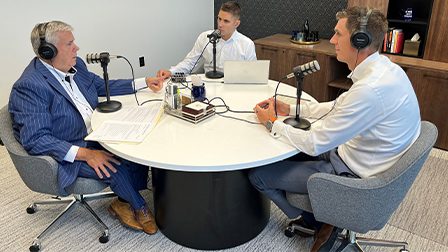
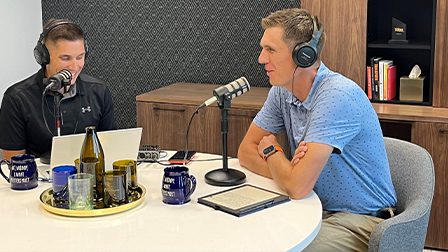
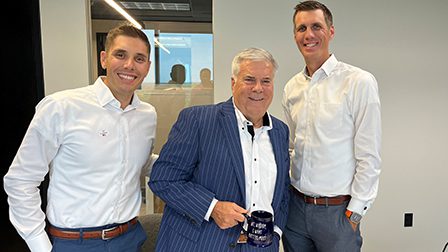
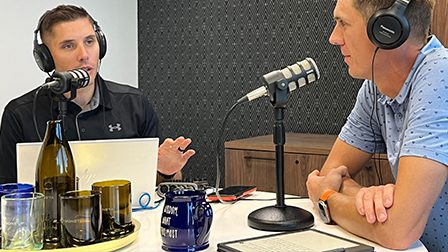
© 2024 Advisory services offered by Moneta Group Investment Advisors, LLC, 100 South Brentwood Blvd., St. Louis, MO 63105 (“MGIA”), an investment adviser registered with the Securities and Exchange Commission (“SEC”). MGIA is a wholly owned subsidiary of Moneta Group, LLC. Registration as an investment adviser does not imply a certain level of skill or training. This is an advertisement. The information contained herein is for informational purposes only, is not intended to be comprehensive or exclusive, and is based on materials deemed reliable, but the accuracy of which has not been verified. Examples contained herein are for illustrative purposes only based on generic assumptions. Given the dynamic nature of the subject matter and the environment in which this communication was written, the information contained herein is subject to change. This is not an offer to sell or buy securities, nor does it represent any specific recommendation. You should consult with an appropriately credentialed professional before making any financial, investment, tax, or legal decision. Past performance is not indicative of future returns. You cannot invest directly in an index. All investments are subject to a risk of loss. Diversification and strategic asset allocation do not assure profit or protect against loss in declining markets. These materials do not take into consideration your personal circumstances, financial or otherwise. Trademarks and copyrights of materials linked herein are the property of their respective owners.
